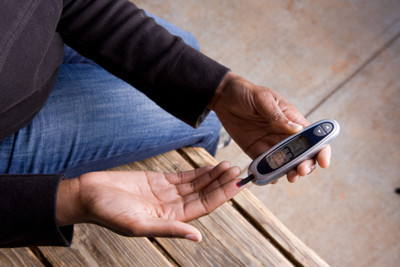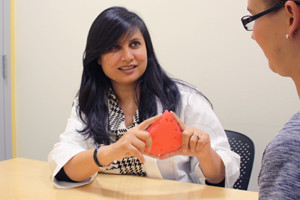Mark Lowers A1C Thanks to Diabetes Education

Mark was diagnosed with diabetes at age 40. Wanting to eventually manage his condition without medication, he turned to the diabetes self-management program at Swedish Hospital.
Mark's primary care doctor discovered he was diabetic during a routine physical. At that time, his A1C, an important blood glucose measurement, was 8.6%. A normal A1C range is from 4.0% to 5.6%.
His doctor prescribed Metformin to help manage the condition. When Mark expressed interest in eventually doing so without medication, she referred him to Swedish Hospital’s Diabetes Community Center, where an accredited self-management program helps provide resources to help individuals with diabetes better manage their condition.
Mark attended a group diabetes education class conducted by Debbie Davis RN, MS, CDE, to learn the basics about the disease and types of available medications. Following this initial session, he benefited from two individual nutrition counseling appointments with Dietitian Muna Siddiqi, MS, RD, CDE.
“The group session provided a basic understanding of diabetes and treatments,” said Mark. “During the individual sessions, Muna discussed my specific diet and what foods I should limit. I learned that it would be beneficial to limit portion sizes and reduce my intake of refined sugars and flour.”
Following the sessions, Mark made positive changes to his diet, including adding vegetables and fruit. He was happy to learn it was not as difficult as he had initially anticipated.

“I took their expert advice and adjusted it to what works for me,” said Mark. “I buy frozen veggies, fresh fruits and fruit cocktails with no added sugar. I started eating whole grain bread and pasta in smaller portions. I check my blood sugar after a meal to see how it is affected by certain foods. And I was happy to learn that unfamiliar healthy foods really do start to taste better after just a short time.”
Positive changes soon followed. “First, I noticed my blood sugar level went down from 230 to around 180. By my second visit with the dietician, my A1C was down to 5.8%, which is in the normal range.”
“Mark took advantage of SH’s Diabetes Community Center which offers comprehensive education, resources and support to patients diagnosed with type 1 or type 2 diabetes, prediabetes and gestational diabetes,” said Muna Siddiqi. “Our diabetes self-management program is accredited by the American Diabetes Association and provides high-quality education to help patients like Mark manage their diabetes.”
Mark has also learned how to enjoy preparing meals at home so he knows exactly what’s in the food he’s eating. “Meal preparation is a good thing,” said Mark. “Not only has my cooking improved, but it’s saved me money and helped me lose weight and inches from my waist.”
“I want to thank Muna and Debbie for sharing their expertise,” said Mark. “I’d encourage anyone with diabetes to take a class and consult a certified diabetes educator to learn the facts about the disease and what you can proactively do yourself to improve your health. There’s a lot of info on the internet, but some of it is not accurate, so it’s nice to have experts help you create a plan that works.”
Whether you are newly diagnosed with diabetes, are struggling to control the condition or would like an update on the latest research, medications and trends about your condition, SH diabetes educators are available to assist you. For more information about our diabetes program, call at 773-989-2292 and ask for Muna Siddiqi or Debbie Davis.
View additional resources at the Diabetes Community Center>>
By Bill Ligas | Published March 14, 2018

